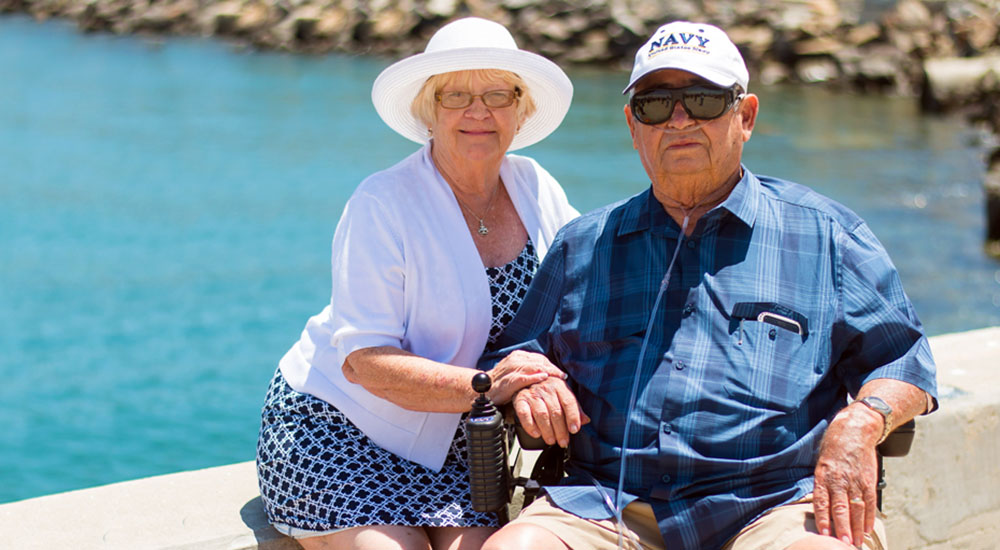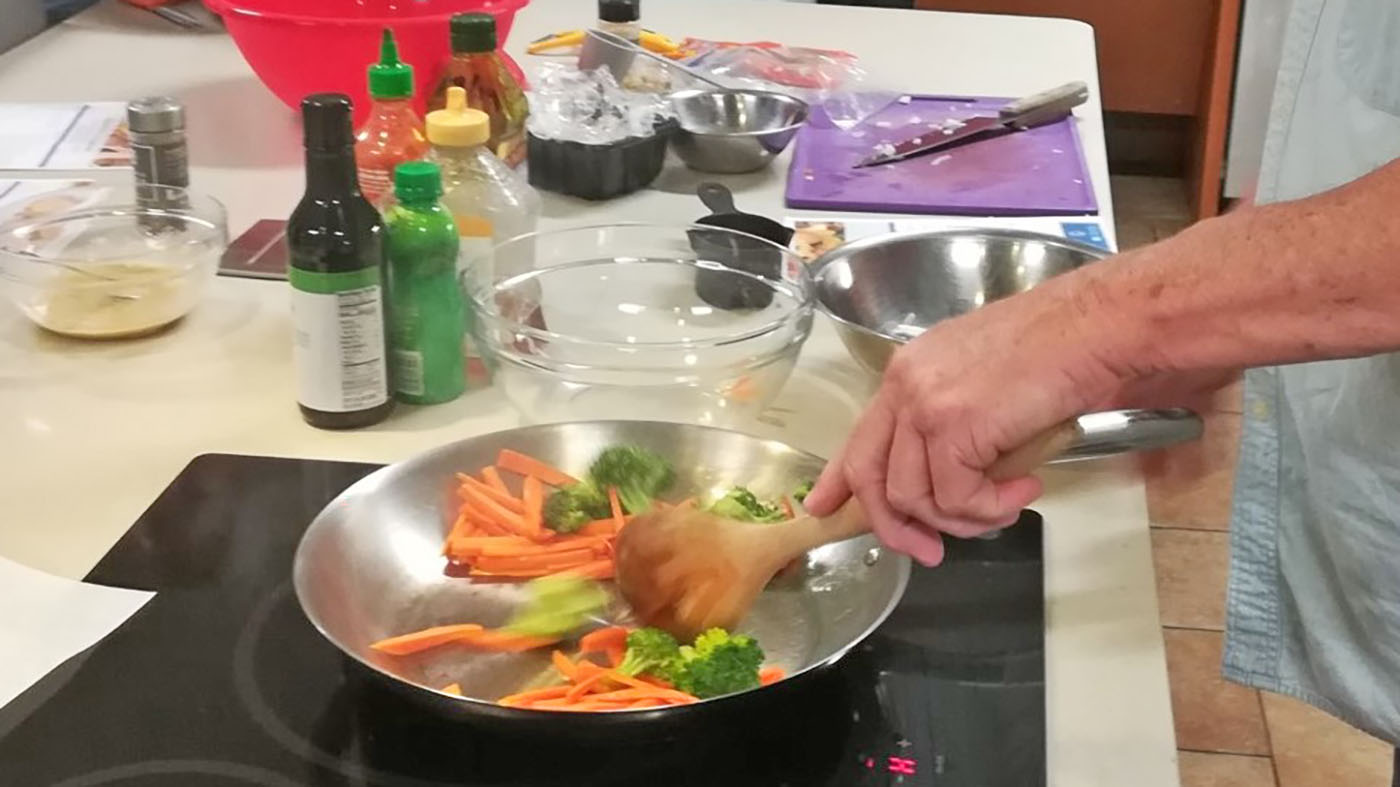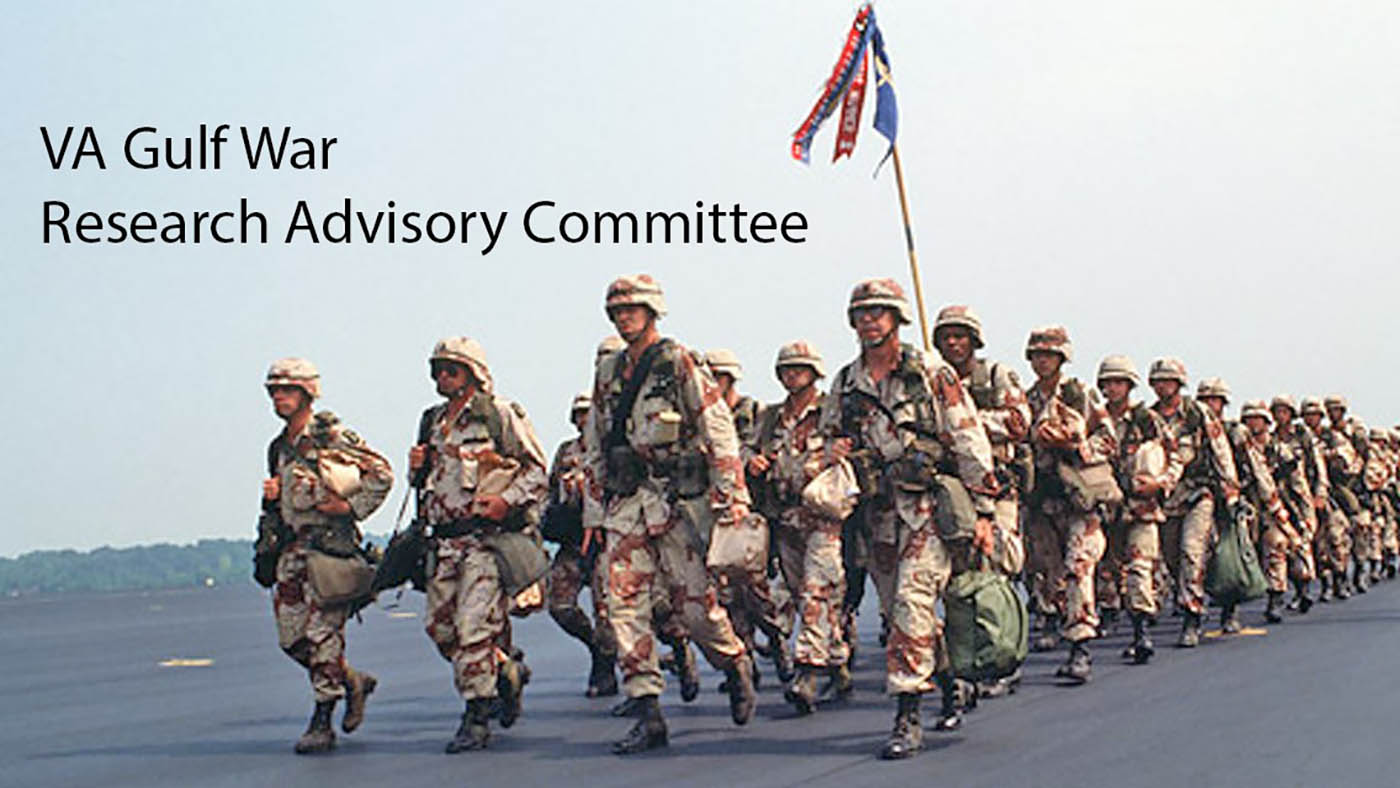Whether you are new to the role of caregiver or have years of experience, chances are you can benefit from the experience, skill and wisdom of other caregivers. The VA Caregiver Peer Support Mentoring Program provides an opportunity for caregivers to receive guidance and to share their experiences, wisdom, skills and passion.
VA caregiver Cathy Thomas is the sole caregiver of her husband of 25 years, Matt. Matt is a retired Army Veteran who receives care at the VA Medical Center in Manchester, N.H.
Thomas (pictured below) feels the program has changed her life, helping her to share the joys of caregiving and also cope with stressful circumstances and situations.
She had been caring for her husband, who lives with post-traumatic stress disorder (PTSD) and peri-traumatic tonic immobility (PTI) for nearly a decade before seeking support.
“I was not aware of VA’s Caregiver Peer Support Mentoring Program. Someone mentioned it to me, so I went online to find the definition of a caregiver. It was then that I learned VA provided caregiver support. I enrolled into the program and was accepted as a mentor.”
Caregivers in rural areas
Since Thomas’ acceptance into the program, she’s experienced an enhanced quality of life. Her passion as a mentor led her to start up a sub-caregiver led peer support group in 2019. The group provides support and discussion for those like herself who reside in the rural area of the state, far from the medical center.
The group consists of six VA caregivers, including a peer in North Carolina and another in North Dakota. Remote members communicate through email or phone. The group members provide each other with a shoulder to lean on, discussing day-to-day experiences and their individual journeys as caregivers.
“We have a great group. We meet for lunch and just talk. It’s our outlet. We talk about the highs, the lows, the challenges and our frustrations of caring for our loved ones.
“Sometimes we discuss our personal goals, projects and our crafts.”
“You feel good that you helped someone”
Thomas’ main objective in forming the group was to provide camaraderie during times when caregivers experience feelings of isolation and loneliness caused by withdrawal from previous habits and lifestyle.
“We build each other up. We’re there for each other. By the time we’re done meeting, a person who was feeling low feels better.
“I love it when mentees have a question and the group addresses it before it turns into a problem. You feel good that you just helped someone.”
Many VA caregivers like Thomas are looking to mentor a peer or provide peer-to-peer support to someone in need. VA is here to provide you with the tools and resources to help you and your loved one.
Caregivers of Veterans of all eras may participate
The program is open to any caregiver of a Veteran who is enrolled in VA health care. The program is open to caregivers for Veterans of all eras. Veterans can serve as a mentor or a mentee. The initial program commitment is six months, but shorter periods may be possible.
The program offers flexible communication, mentorship opportunities
Mentors and mentees communicate using email, telephone and letter writing depending on what works best for both of them. VA is starting to match caregivers in the same geographic locations to allow them to meet in person more easily.
In addition, the Caregiver Support Line offers monthly telephone education groups where caregivers can discuss self-care tips and ask questions on a variety of topics.
Want to learn more about the monthly calls? Listen to a recording or view an educational handout.
Mentors are volunteers with the Voluntary Services Department within the local VA medical center and receive training before being paired with another caregiver.
Spanish-speaking caregiver support
Telephone support group calls are available in Spanish by the VA Caregiver Peer Support Mentoring Program. Calls are open to caregivers of Veterans of all eras.
For information, call 1-800-767-1750, code 30595, beginning at 2 p.m. ET.
Support group calls and dates for Spanish-speaking caregivers:
June 10: Caregiver Point of View – VA Navigation
September 9: Caregiver Point of View – What is it to be a Caregiver
The Caregiver Peer Support Mentoring Program could help you strengthen relationships with other caregivers, provide an opportunity for networking and empower others.
If you would like to participate in the program, contact your caregiver support coordinator.
Megan L. Jones is a communications specialist with Patient Care Services.
Topics in this story
More Stories
VA promotes early nutrition intervention for chronic kidney disease with targeted programs like Heathier Kidneys Through Your Kitchen.
VA Research Advisory Committee on Gulf War Veterans’ Illnesses hosting Veteran Engagement Sessions in Phoenix for 1990-91 Gulf War Veterans.
Navy Veteran and president of the American Medical Association got a colonoscopy and encourages other Veterans to do the same.








My Husband served 22 1/2 years in the Army. He retired in 1996.
He worked as a Contractor till 2015 and retired in May. December 2015 he had a Severe Right Brain Stroke. He is able to walk with a brace and hemi-walker. I am now his full-time Caregiver. We are both in our mid-sixties.
I would love to join a group for Caregiver support.
Thank you
I’d love to do this but I’d have a difficult time relating to a young Caregiver being paid and dealing with PTSD. I’d do much better with someone learning to provided for a physically wounded vet who’s dealing with work at the same time